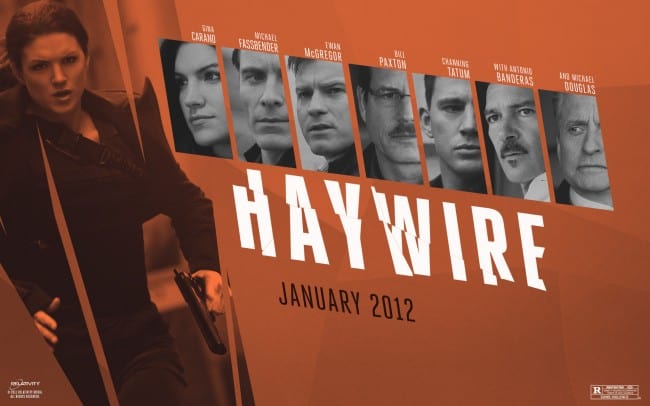
Movie Review: ‘HAYWIRE’
Steven Soderbergh is a director that likes to try new things. Aside from delving into a wide array of film genres and experimenting with styles, the man also likes to take a chance on non-actors. In 2009 Soderbergh handed the lead of The Girlfriend Experience to a newcomer to the big-screen, Sasha Grey (though a veteran of the small-screen with her pornography career). With Haywire, the rumored to be retiring director tries his hand with his first all-out action film while also taking a chance on MMA fighter turned actor Gina Carano. The double risk unfortunately doesn’t pay off as much as you would think even though Soderbergh tries his hardest to make it work.
With a script from Lem Dobbs (Dark City, The Limey), Haywire begins with an already exhausted Mallory (Gina Carano) fighting for her life in a roadside diner against her former colleague and lover Aaron (Channing Tatum). After a narrow escape with the help of an innocent witness, we learn the details of Mallory’s life as a contractor for hire used by the Government whenever they need something swept under the rug. Mallory recounts to her helpful young passenger that she, Aaron, and two others were hired to rescue a Chinese hostage. The successful mission leads her contact man Kenneth (Ewan McGregor) to hire the assassin for yet another mission. In a new mission that takes us to Dublin, Mallory gets in over her head when she is double-crossed and set-up by her partner (Michael Fassbender). What follows is a series of action set-pieces that has our deadly beauty hunting down the men responsible for betraying her.
It’s not the most original idea, but that’s not what makes Haywire an unexciting foray for Soderbergh into the espionage action arena. In fact, not much blame can be attributed to the director. His keen sense of style and precise camera-work (it’s now well-known that Soderbergh edits and shoots all of his films under two different pseudonyms) captures the picturesque locations and good-looking cast with ease and finesse. The main problems can all be traced back to Lem Dobbs’ script that fails to keep the audience interested between Carano flipping, jumping, and punching her way through the cast. The fractured timeline is used as a device to throw us immediately into the action and to excite us with unnecessary shifts in time. All of this leads to awkward pacing issues and a failure to create any tension from the lazy script.
Soderbergh tries hard to make a spy/action film that doesn’t feel like the overly kinetic Run Lola Run, Bourne Supremacy films that we have come to expect from a film of this nature. One of the ways he refuses to constrain with the standard genre tropes is by avoiding to include any musical accompaniment during the action sequences. Crashes and the sounds of pummeling flesh are the soundtrack that we are forced to listen to. Add to that the fact that Soderbergh interjects few cuts during these scenes creating ongoing shots of hard-hitting violence. Yet, he chooses to include a unique musical score created by David Holmes prior to the action that manages to invoke a retro 60’s style while still seeming fresh. You know when an action sequence is about to begin because the music automatically comes to a halt. This and the odd pauses in the story and action initially feels refreshing but slowly becomes desperate and cheap. In doing what is least expected from a film like this, Soderbergh has made a self-aware spy send-up that feels nothing like the films he apparently was inspired by (Funeral in Berlin, Billion-Dollar Brain). It instead feels like a plastic product that is intentionally high on style.
This wouldn’t be as big of a problem if we cared a little more about our hero’s revenge driven journey. It doesn’t help that Carano can’t deliver a line of dialogue like she can her high-kicks. Her vocal and emotional range is just as limited as what Dobbs’ script has given her to work with. It makes you appreciate that she at least looks pretty when kicking-ass. The remaining characters are given the same lack of attention leaving such talented actors like Bill Paxton and Michael Douglas only a handful of scenes that end up seeming more like filler in the 93 min. run time. By the time the reasons behind Mallory’s double-cross are finally revealed, the inane logic behind it all seems all the more disappointing in what could have been a tense thriller.
This is the main felony of this criminally disappointing spy flick. If the same attention was paid in developing characters and constructing an engaging story that was used by Soderbergh to film and direct the action sequences, Haywire might have been more than just an average B flick. When a talented filmmaker who has delivered so many classics during his short but definitive career fails, it is all the more frustrating of an experience for a fan of his like myself. Haywire includes some riveting set-pieces that will thrill some audiences. However, the mixed-aged, Sunday afternoon crowd that I saw this with remained perplexed and overly quiet during the duration of the film and well after the credits rolled. You could almost hear the air escaping from this overly pumped-up action flick as it slowly escaped after its show-stopper of an opening scene. On paper (and in its terrific trailers), Haywire exists as a tight and gripping espionage flick that defies what’s expected of it. As it stands though, Soderbergh’s foray into action is “much ado about nothing.”

